Adil Najam
Today, March 16th, marks the death anniversary of former Pakistan Prime Minister Mohammad Khan Junejo who died on this date in 1993. It is not a date that is likely to be marked by much ceremony or rememberance.
Yet he was the Prime Minister of this country and some of his decisions helped shape some of the momentous twists and turns of our recent history. As Gen. Zia-ul-Haq’s chosen appointee, was never a person who held much ‘real’ power in the country. Yet, one could argue that he helped shape the calculus of power that was to follow his tumultuous tenure, including his eventual falling out with Gen. Zia-ul-Haq.
There are those who would argue that Mohammad Khan Junejo was yet one more puppet in hat has been one long putli tamasha. Others, however, would insist – with some admiration – that for all his faults he was an honorable man trying to seek an honorable path out of a dishonorable situation?
Which is it? Could it be both? Or, maybe, neither? What are we to make to Muhammad Khan Junejo? How should we remember him on this day?
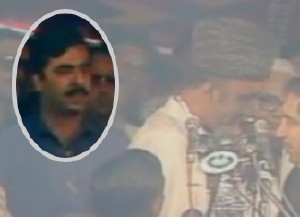 P.S. Do watch the video above with some care. It is fascinating to see a much younger Aitizaz Ahsan analyzing the politics of the time. I also wonder who the young man who is standing behind then Prime Minister Junejo (at min. 5:04m on the video) might be? Is it, by any chance, a much younger (and now Prime Minister) Yousuf Raza Gillani? It well could be. Mr. Gillani was, after all, a member of the the Junejo (and, therefore, Zia) Cabinet – serving first as Minister of Housing and Works and later as Minister of Railways.
P.S. Do watch the video above with some care. It is fascinating to see a much younger Aitizaz Ahsan analyzing the politics of the time. I also wonder who the young man who is standing behind then Prime Minister Junejo (at min. 5:04m on the video) might be? Is it, by any chance, a much younger (and now Prime Minister) Yousuf Raza Gillani? It well could be. Mr. Gillani was, after all, a member of the the Junejo (and, therefore, Zia) Cabinet – serving first as Minister of Housing and Works and later as Minister of Railways.
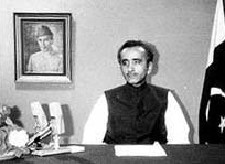
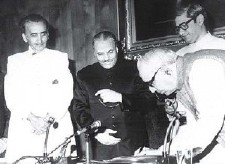
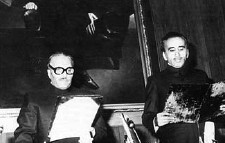
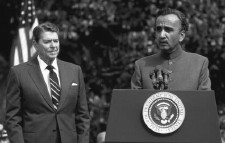



















































Very interesting video find.
Makes one think about al we have gone through
In today’s Pakistan a ‘sharif admi’ is one who *doesn’t* abuse power, take rishwat, flaunt his position, treat others badly, steal, lie, etc to say the least. Arent these virtues of a muslim? didnt we beat our chests and proclaim our nation a bastion of Islam and we the guardians of this faith as ordained by Him?
Why then do we respect everyone who *does* the above and mock the one who *doesnt*. Isn’t that hypocrisy? and isn’t that disliked in Islam as well? In today’s Pakistan the chorr & uchakka is a revered & respectable citizen because he/she goes to *perform* Hajj & Umra (on haram money), the rest of the wretched citizenry are flies on the wall.
@Aqil. totally agreed with the last paragrpah of your comment.
It depends on the lens through which we look at him.
First, he was a “prime minister”, not a prime minister, in the sense that he held the title but not any of the power… sort of like our current “prime minister”.
He caused no harm, and therefore he was better than almost every leader we’ve had. On the other hand, he was powerless and ineffective, so there is not much to remember him for.
It is a sad commentary on our political history that a leader who does nothing is considered far better than anyone else.
It seems that he was a decent man trying to do the best in the given situation. Most importantly, there were no corruption scandles about him.
The video is interesting. And in some way it, and the politics of the characters in it highlights what’s wrong with the country’s politics.
Junejo was kicked out by Zia, and then NS and others in the party stabbed him. Today, the same NS and his PML-N maintain a tone of self-righteousness about PML-Q. Even though, Junejo was a much more decent man compared to NS and Shahbaz, and for this reason, ditching him when Zia decided to get rid of him was a much more disgraceful act than the so called betrayal by those who joined the PML-Q. After all, there was nothing extra-ordinarily praise-worthy on part of those who stayed in PML-N in Musharraf years only to insist on a single point agenda of bringing the exiled Sharifs back despite their much less than honourable politics and history of how they accumulated so much wealth. It’s not that they were bursting with passion to serve the people, or really struggling for some democratic principle, when nothing in their politics suggested that they were really about addressing the issues of the people and building genuine democracy.
The other prominent characters in the video, namely BB and Aitezaz have similar issues in their politics. Unlike Junejo, BB’s two stints in power were marked with corruption on a mega scale, in which she and her own husband were fully involved. Yet, BB is the revered leader, and is being called shaheed even by some of those who never agreed with her politics when she was alive.
At best the clean Junejo is mentioned as a decent man, and at worst, as a puppet. But the corrupt Bhuttos and Sharifs are seen as the “indispensible politicians, without whom democracy can’t exist.” This contrast of our attitudes towards them is the tragedy of our politics.